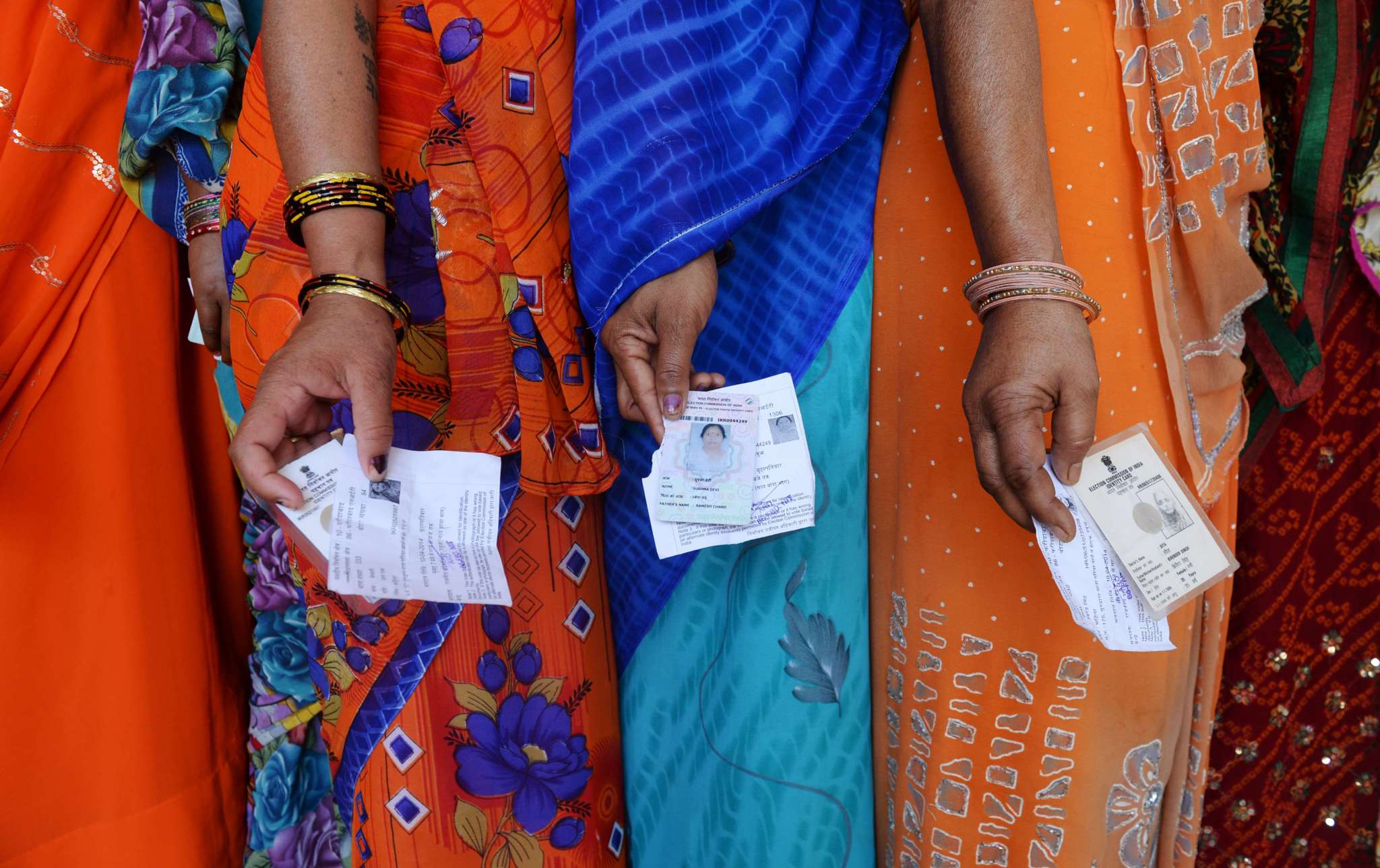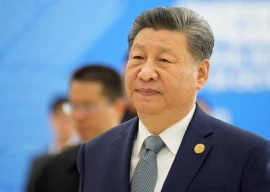
Less than a fifth of the candidates standing for the front-running main opposition group, the Bharatiya Janata Party (BJP), or the ruling Congress, are women, according to an analysis by AFP.
In the current parliament, women hold only 11 percent of seats in both houses, less than Pakistan at 21 percent and Afghanistan at 28 percent, research by the Inter-Parliamentary Union group shows.
"Suddenly it's women this and women that... but it all fades after elections," said Rachita Shah, a 28-year-old graphic web designer.
"It's nice to hear, but it would be better if we could actually see these 'measures for women's empowerment'," she said, mockingly using air quotes while shopping at a busy Delhi flea market.
Politicians are going all out to win over women -- earlier seen as wallflowers -- with "empowerment", a recurrent theme 16 months after the fatal gang rape of a student on a bus in New Delhi rocked the nation.
That case, which led to protests in the capital, sparked intense media scrutiny of the widespread abuse of women, forcing efforts to sensitise men and counter discrimination.
Many women voters, who form 49 percent of the 814 million electorate, say they are pleased to see the BJP splashing billboards, newspapers, radio and TV slots with vows for women's safety.
Nine in ten Indians see rape as a "very big problem", while eight in ten believe the problem is growing, a study published last week by the US-based Pew Research Center said.
"It feels good that the focus is on us, finally," said shopkeeper Gauri Joshi, 35, in suburban Delhi.
But others are unconvinced by the attention, accusing parties of cynically tapping into the national anger over the Delhi rape case and others which have reversed years of complacency about growing sexual violence.
"How can we expect change when a lot of these politicians hate women and think rape is normal?" said Shagun Behl, a 26-year-old dance teacher.
Shagun was referring to Mulayam Singh Yadav, leader of the regional Samajwadi Party, who triggered outrage on April 11 when he described a group of convicted rapists as "boys" who had made "mistakes".
BJP prime ministerial candidate Narendra Modi criticised Yadav's remarks in a TV interview, saying women's issues should be dealt with sensitivity.
"My priority is women's dignity," Modi promised.
But the 63-year-old also spurred controversy a few days before Yadav's comments when he belatedly declared that he was married to a woman he had never previously acknowledged or divorced.
His rival Rahul Gandhi, leading campaigning for the Congress party, accused him of hypocrisy, saying Modi promised respect for women but neglected his own wife.
While the Congress party says it will provide free sanitary napkins and set up crisis centres for women, the BJP vows to introduce self-defence classes in school and to earmark extra spending on women.
They have both pledged to pass the pending Women's Reservation Bill that would reserve a third of seats in national and state assemblies for women among other measures.
"The women's bill is being blocked out of pure misogyny ... Even the manifestos have a long way to go. Most of the promises are appallingly vague," said Kavita Krishnan, secretary of the All India Progressive Women's Association.
Politician Meenakshi Lekhi, who is standing for the BJP in New Delhi, acknowledged the general lack of women in politics.
Until recently the president was a woman and the most powerful politician of the last 10 years has been Sonia Gandhi, head of the Congress party. Three regional party chiefs are also female.
But below these public figureheads, men predominate.
"You can't change 65 years of Indian history overnight where women have more or less stayed out of politics. But the paradigm is changing now," Lekhi told AFP, adding that political parties would field more women had they been "available".
The BJP is tipped to oust the ruling Congress after its two terms in power in the staggered five-week election that ends with results on May 16.
The father of the New Delhi gang rape victim, who died of her injuries two weeks after the assault, said only then would the real test on women's rights begin.
"All these promises are just words to win votes. Let's see if they ever see the light of day," he told AFP.
COMMENTS (15)
Comments are moderated and generally will be posted if they are on-topic and not abusive.
For more information, please see our Comments FAQ


1725443747-0/Untitled-design-(5)1725443747-0-165x106.webp)






1731570357-0/elon-musk-(1)1731570357-0-270x192.webp)







@Patriot: Indeed female foeticide is a legitimate problem that needs to be addressed on war footing. As the article you mentioned points out this is illegal but people do it anyway. This has to do with son preference - since people do not want too many children, they abort female foetus so that they can have only the male children. Of course this is terrible and needs to be addressed but it requires a holistic approach to change societal mindset including empowering women educationally, economonically and politically. This is underway and right now the ratio of girls to boys in primary schools in 100% and secondary schools is85% and rising. A million women are part of local government (panchayats) in India where there is 33% reservation and in NREGA - a state funded rural income generation program, preference is given to women.
Secondly you may not be aware but foeticide is a problem in Pakistan also as judged by the sex ratio. Instead of gloating over India's problems you should focus on fixing the problem in your country.
Thirdly, the women elected in Indian parliament or state legislatures do so on open seats. They are not stand ins for theier wadera fathers or husbands. Party chiefs of 4 political parties- Congress (I), Trinamool COngress, AIADMK and Bahujan Samaj Party are women. Chief Ministers of 3 states, our current speaker, current leader of opposition are women.
Finally regardless of percentage of women in the parliament, unlike Pakistan where violence against women bill could not be passed, pro women legislation does get passed in the Indian parliament including the most recent tightening of legislation on rape.
Yes and look at how progressive pakistahahahahaha sry can't even complete the joke. :(
our women rule the banking and IT sector... though i agree in politics they are represented very lowly....true ...
This makes sense with these kind of reports printed elsewhere. Even though the practice of foetecide is outlawed, 300,000 to 600,000 female fetuses are aborted every year in India because of the preference for boys, according to a 2011 study by The Lancet. And the discrimination that begins while in the womb continues throughout a girl's life.
http://edition.cnn.com/2013/01/12/world/asia/india-women-challenge/
@Lunacyassailam: What is the point you are making. You should change your name to just 'Lunatic'. your vies are downright deplorable and disgusting.
@sparta no indian is going to Pakistan or Bangladesh. As far as millions going arab countries, indians also go to western countries,so do Chinese Australian etc. This is era of globalisation people travel places for better opportunities. As far as Arabs please do research there are many Arabs staying and studying in india. They don't find this amount of freedom in their own country like Saudi etc and shift base here.
Women or independent-minded persons? Are pakistani women independent-minded or just quota-women or forefront-women for macho muslim men. It is not about numbers but about quality. You can have a 50% quota for women - but what use if these women are scared of men and of islamic machoism and ingrained misogyny?
@Lunacyassailam: lol millions of indians work in the gulf arab states and send back money to their families back in India, in fact the reason why Kerala(india's richest state) grew so fast was because of the remittances it received from it's diaspora in the GCC states, and these same people love to curse Arabs and Muslims, so you shouldn't be hypocritical.
Three chief minister of state bengal,Tamil Nadu,Rajasthan are woman. So are former CM of UP Mayawati and former president of india. The most powerful person in india is also a woman sonia gandhi. Of course we have long way to go. But we are moving in right direction.
So that would imply; India as a whole is subjugating women?in that case,they would have migrated to noble Pakistan and Bangladesh right?.But thats not the case, in fact its the reverse.Its Pakistanis and "Arabs" who wanted to, still want to infiltrate India and Bangladeshis want to come here and plough the fields, for which Indians pay well, twice as much as they earn in Bangladesh, with food and rest.After they build the factories, they are sent back to their homes in Bangladesh.So, what were you saying again?
I am all for reservations for women in local government elections and indeed we do have reservation for women in many states in India for those elections. My own ward is an OBC (women) reserved ward.
At this point in time, I would not support women's reservation in parliament however. Instead the best person regardless of caste, creed or gender should be elected to parliament. We first need to get rid of criminals and caste/religion based candidates. The other reason is that I have seen in my own ward that my corporator's husband is pulling the strings behind her. The corporator is better educated than her husband and quite capable on her own, but she is unable to work independently. Nothing will change until more women are actively involved in politics and we need to ensure at the grass-roots level that are able to participate.
In India women don't have back door entry like in pakistan. They have to fight election and enter the house. Once women reservation act comes through we will see not less than 33% women in each Assembly.
I don't know if the sheer number of women actually translates into women rights in a country. Pakistan has a significant number of women, elected directly and indirectly but I don't think that reflects their standing in the society in general here.
due to inclusion of more women , pak and afghan parliament have been more vibrant.